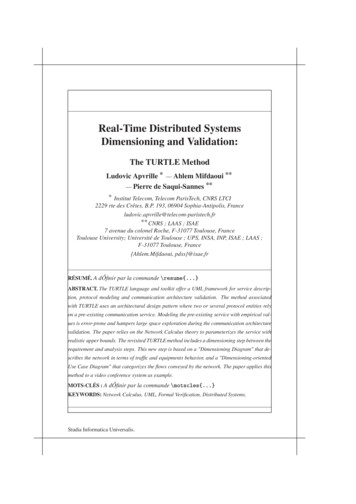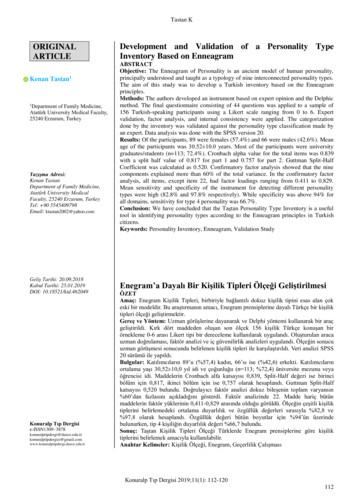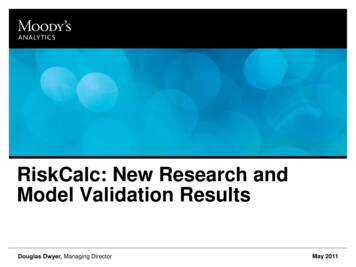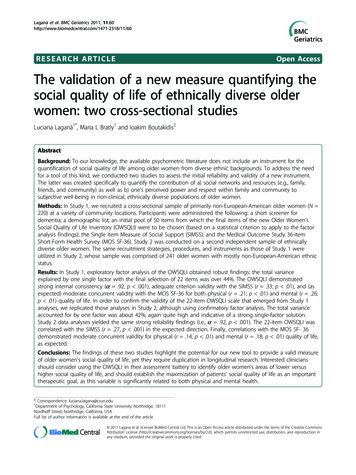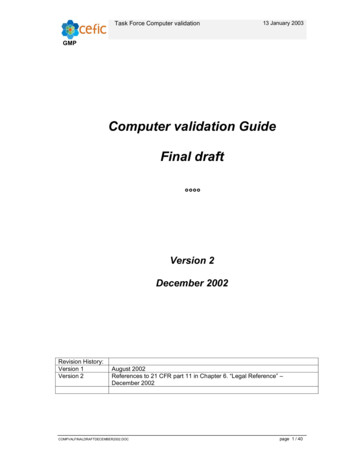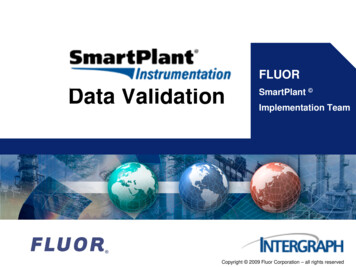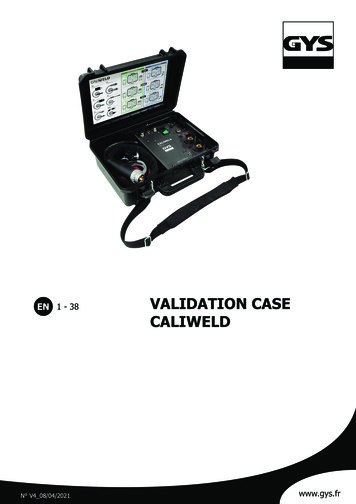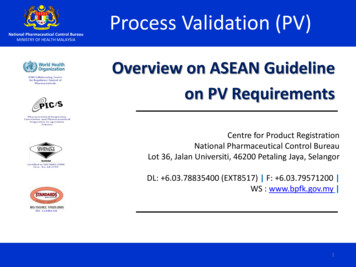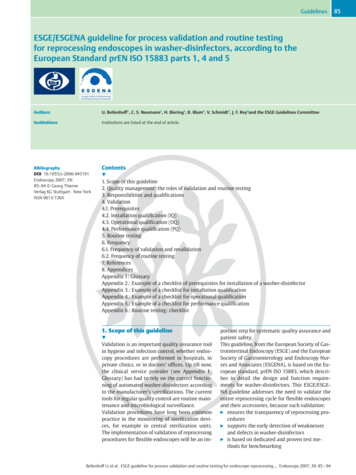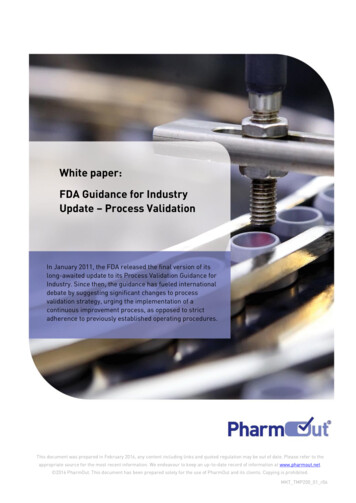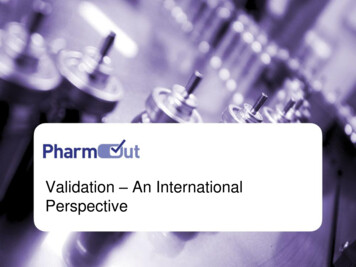
Transcription
Validation – An InternationalPerspective
Agenda Perceived industry problems - FromQTPP/PQA Process Validation Paradigm shifts– Process Validation based on QbD, DesignSpace, etc. Incremental changes– Plain vanilla validation – Annex 15– Integrated C&Q – ISPE Baseline– ASTM E2500Slide 2
What are the perceived problems inour industry ? Variable quality of drugs/medicines.Poor Manufacturing practices.High costs.Too many batch failures & product recalls.Poor product specifications.– CQAs not fully understood.– Means CPPs not fully defined (risk not managed). Post-approval manufacturing changes resisted, leading to limitedprocess improvement.– Slow process.– Too cumbersome.– Insufficient information from the pharmaceutical development of products. Not widespread use of PAT, QbD, Quality Risk Management, etc?Slide 3
ICH is on the case ! ICH Q8 Guideline on PharmaceuticalDevelopment ICH Q9 Guideline on Risk Management ICH Q10 Quality Management: Utilisation ofscience and risk-based systems to enable post-approval change &improvement” ICH Q11 Development and manufactureof drug substances (chemical entities andbiotechnological/biological entities) Recognises vital link API Dosage form.Slide 4
Paradigm Shift – Process Validation Regulatory perspective– US FDA driven– EU following– Other nations variable Essential shift– Risk & Science based (ICH Q8,9,10)– Continuum to maintain the validated state– In other words, a higher degree of control is appropriate for attributesor parameters that pose a higher risk.– 3 Stage Process Validation (US FDA) Process Design Process (Performance) Qualification Continued Process verification– No mention of 3 magic batches– No mention of Facility/Equipment QualificationSlide 5
Incremental Shift- Qualification Annex 15 [Plain vanilla validation]– Seems rigid DQ IQ OQ PQ.– In EU, where created, it is guidance NOT a regulation or law.– Actually “Risk Based” approach is suggested “A risk assessmentapproach should be used to determine the scope and extent ofvalidation.” ISPE Baseline Guide (vol 5) Commissioning & Qualification[Integrated C&Q]– Leverages efficiency and focus by recommending.– Systems be identified by Impact on product quality.– Components be identified by criticality. ASTM E2500 [Brave new world for some]– “Standard for specification, design, and verification of pharmaceuticaland bio-pharmaceutical manufacturing systems and equipment.– Reliance on verification of suitability by subject matter experts.Slide 6
ASTM E 2500-07 What is it? US & US FDA driven. “A risk-based and science-based approach to the specification,design, and verification of manufacturing systems and equipmentthat have the potential to affect product quality and patient safety.” “The overall objective is to provide manufacturing capability tosupport defined and controlled processes that can consistentlyproduce product meeting defined quality requirements.” Approved June 1, 2007. A voluntary consensus standard. Stresses expert analysis of critical elements that affect productquality.– Quality, (not Quality Assurance or Quality Unit) appears 44 times– Expert appears 21 times– Critical appears 20 timesSlide 7
ISPE Baseline vol5 is about this!Annex 15 (plain dDesignReview DQQualityConstructionIQ, OQ, nEnhancedDesignReview DQSlide 8ProcessValidationQualityIQ, OQ, PQProcessValidationCommissioningIntegrated C&Q
ASTM E2500 is about this!Integrated C&QASTM 2500Slide 9
My experience in the real world In emerging nations:– Plain Vanilla Integrated C&Q Pharmaceutical firm’s QA reluctant to relinquish responsibility(power & influence). Regulatory authorities inexperienced to adjudicate “RiskBased” practices. No confidence in vendors & contractors.– Brave new world (ASTM E2500) Not on the radar. US oriented.A step way too far.Reluctance/inappropriate to pass things to vendors.Unlikely to find SMEs.– Process validation change not contemplatedSlide 10
My experience in the real world In developed nations:– Plain Vanilla Integrated C&Q Well accepted. Some vendors and contractors fail to deliver.– Integrated C&Q ASTM E2500 (Brave new world) Embraced by a few. Still some QA concerns about loosing control. Not Annex 15 compliant (if considered a regulation).– Process validation embraced by a few, mainly bigpharma.Slide 11
Summary of the incremental shift invalidation qualification Avoid duplication of inspections and tests. Computer and control/automation system validation integrated withother disciplines (GAMP still the favoured toolbox). Pass more responsibility to capable vendors and contractors. Make DQ work harder– More structured and thorough process.– SME does verification.– Confirm URS is complied with. IQ becomes an engineering technical function.– Integrated with general engineering QC.– Systematic checking for completeness.– QA oversight. More effective Performance Testing– Integration testing of whole system.– Challenge testing.– Proves fitness for purpose.Slide 12
Reminder - Objectives of qualification All validation steps should confirm good news, not findproblems. All the real work is done in the project discussions. If westart basic discussions during validation .IT IS TOOLATE! Provides platform for QA oversight on systems that havea direct effect on product quality. Annex 15 of the EU/PIC-S GMP addresses validation in amore rigid way. ASTM E2500 Helps manage the work burden by usingexperts and risk based thinking to concentrate thequalification effort.Slide 13
Thanks for your attentionSlide 14
–Integrated C&Q ASTM E2500 (Brave new world) Embraced by a few. Still some QA concerns about loosing control. Not Annex 15 compliant (if considered a regulation). –Process validation embraced by a few, mainly big pharma. Slide 11 . Summary of the incremental shift in validation qualification Avoid duplication of inspections and tests. Computer and control/automation system .
